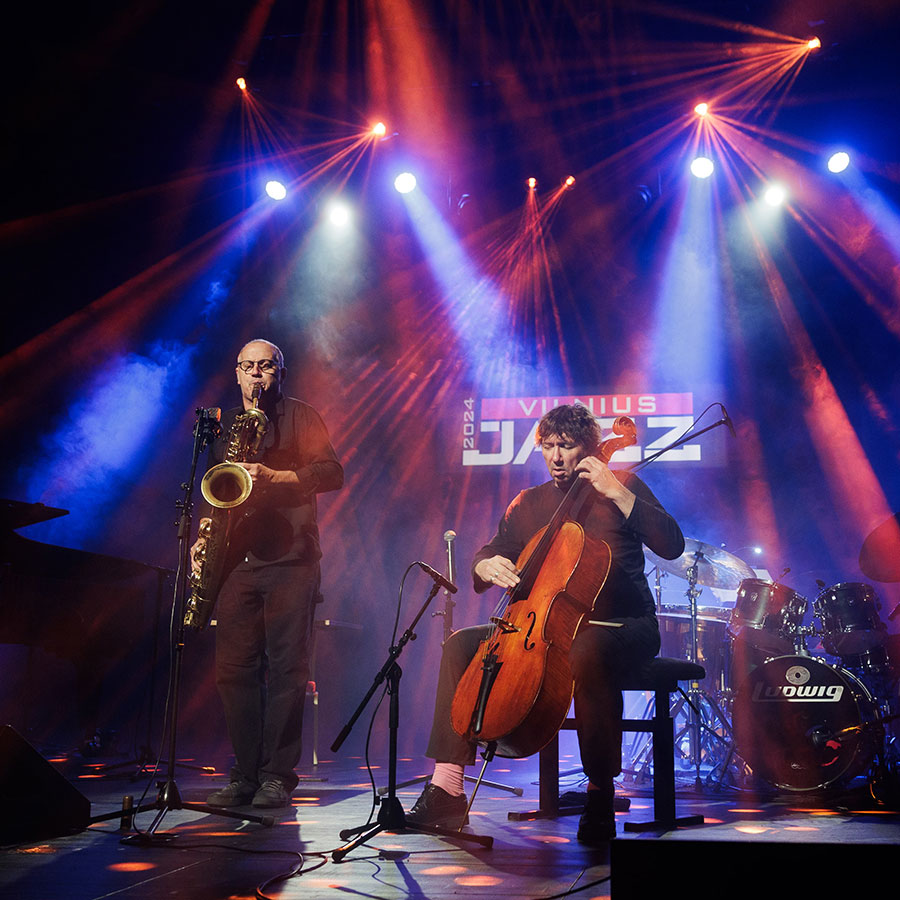
Vilnius Jazz is now in its 37th edition, which for me is the second since I first came here last year (see article on couleursjazz.fr).
First night
And it begins with a series of very varied duets, the first of which brings together two historic figures of Lithuanian culture – and not only Lithuanian culture: the septuagenarian drummer-percussionist Vladimir Tarasov, born in Russia but established in Vilnius for several decades and the nonagenarian poet (he will celebrate his 92nd birthday the day after tonight’s concert) Vytautas Landsbergis, about whom I must give you some background information: musicologist, chess player, poet and politician, Landsbergis was the first president of Lithuania after it was liberated from the Soviet yoke.
So, it’s a living legend, a symbolic father figure – a type of man no longer to be found in our cramped Hexagon – who steps onto the stage leaning on his cane.
And it’s Tarasov who kicks off the concert with a hyper-melodic, sparing performance on his hypertrophied kit.
He gives us a taste of his little music, while the poet calmly waits his turn.
And when his voice rises a few minutes later, it’s alternately clamoring and crooning with a phrasing that leaves plenty of room for silence. Tarasov‘s mallets resonate on his tuned toms and the bells tinkle as he speeds up and then slows down the tempo.
I obviously understand nothing of what Landsbergis is reciting, but on the one hand, I’m thinking that you wouldn’t hear this in France (except perhaps in a few closed, intellectual-elitist circles), where poetry has become a confidential, elite art form…
Except for my main Man Jacques Réda, who has just left us at 95 (see tribute, on couleursjazz.fr also).
On the other hand, the sounds of the Lithuanian language and the fluctuating flow of the poet’s speech are fascinating and highly musical.
The orchestral timpani then whirr, followed by the gentle sound of chimes and a pretty little melody. There’s no doubt – not even Cartesian, René – that these two men know each other and share the same approach to music, where the voices of drums, lowly great the toms and cymbals unleash their thunderous fury, the poet remains silent, observing his percussive partner attentively as he awaits his turn.
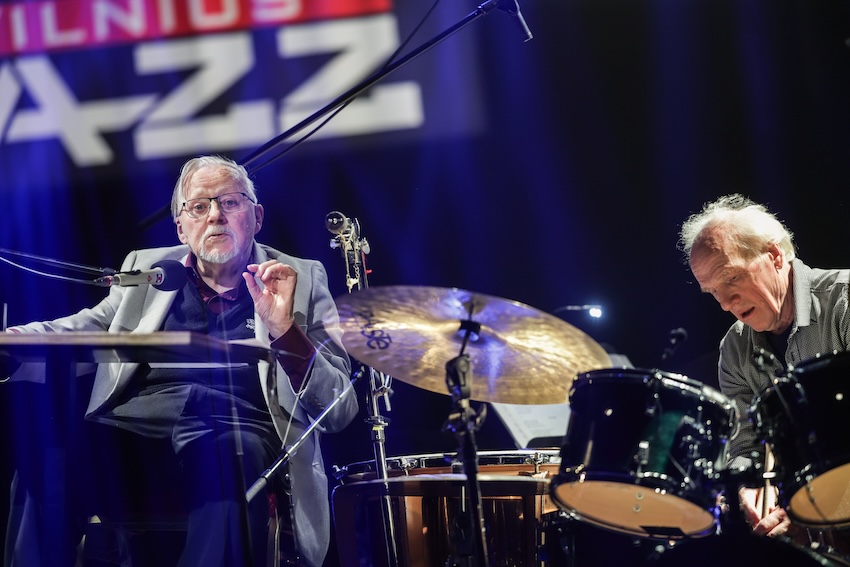
Vytautas Landsbergis & Vladimir Tarasov
And it’s to Landsbergis‘s voice that Tarasov ends the concert with a drumming of great colorist limpidity, before leaving the tubular bells to ring out the last notes of this beautiful opening concert.
Next up are two little (sic) Frenchies I know well but have never had the chance to hear together. Yet baritone sax and cello are something you hear on every street corner in our beautiful country. No, you don’t…
Strange as well as bizarre!
In any case, two low voices that can go high if they want to and that multiply the angles of attack of their instrument, that’s low key great. Bowing across the whole range of the cello – legato or staccato – for one, or playing in guitar chords, riffing in the low register of the baritone for the other, and melody in the high register.
Both – Vincent Courtois (vcl) and François Corneloup (bs) – are goddamn maestros on their axe. A four-string axe? Quénum, you’re off the rails, my man! Well, not more than the two of them, in any case, who slalom and surf merrily between raucousness and cantabile, all without the slightest score! Because they know each other so well. And it’s a journey where the wood of the reeds and the resonance box and the metal of the sax body and the cello strings vibrate in unison in a song that’s seriously enchanting, melodious (oh gods!) or free-sounding, that goes by quietly or breathlessly and hits you in the groin, the guts, the eardrums and straight to the heart.
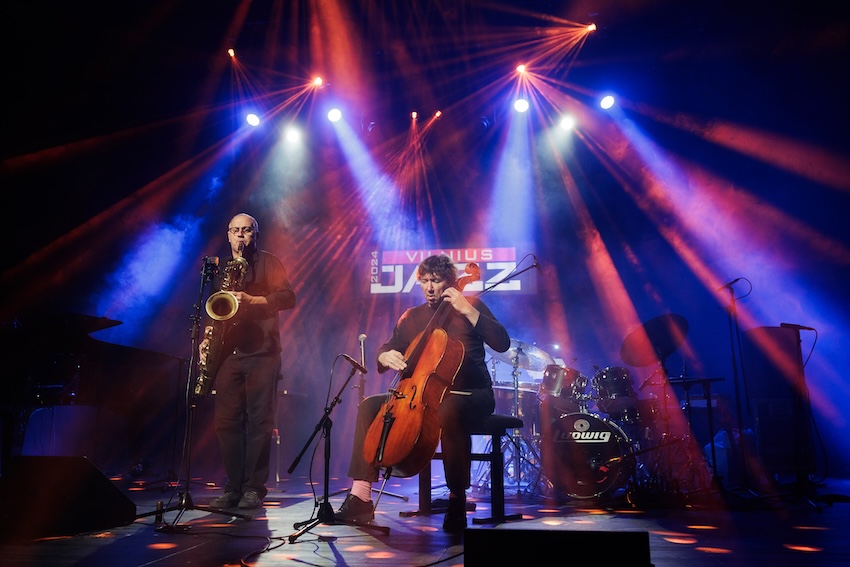
Vincent Courtois & François Courneloup
This is followed by another duo (yes, again, but I warned you, and it takes two to tango, as the English-speaking Argentinians say) and it’s just as well, and a pig (hallal, of course) who takes the piss! After the Lithuanians, then the Franzouskys, here come the Australians. The program of Antanas Gustys, the festival’s boss and creator, is creative as hell, and as I describe it to you, you’ll think: “Where else in Europe can you see/hear such a diversity of music?”
Piano (Alister Spence) and drums (Tony Buck), that’s not very common either. The keyboard is generally lyrical, with sharp chords, inventive arpeggios – either percussive or pearlescent – and a lilting, endearing melody.
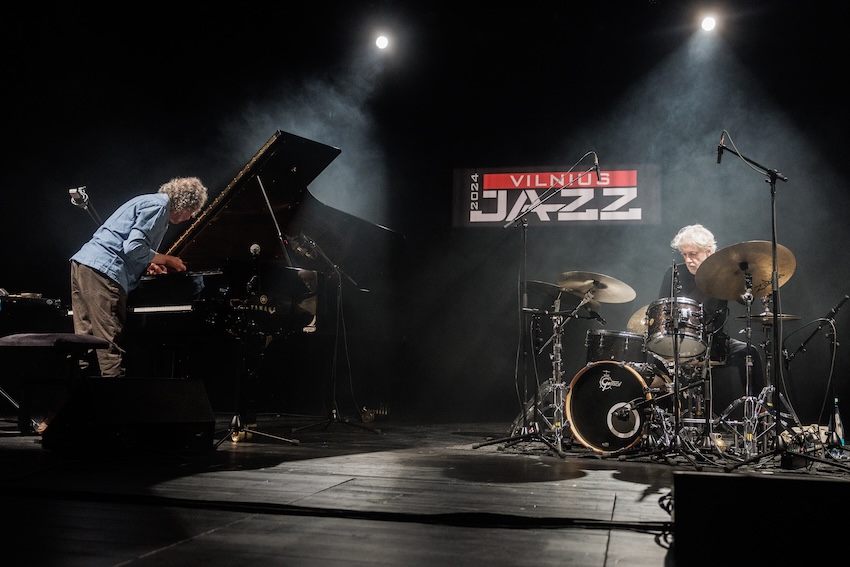
Alister Spence & Tony Buck
As for the drums, they use a wide variety of strikes and techniques – such as the edge of the cymbals rubbed with a bow – while listening attentively to their partner’s 88 keys. The latter now moves on to higher speed and power, often in chords, while maintaining the melodic vein and a certain gentleness, while the drummer supports him magnificently.
Then it’s back to spiked notes, with plenty of space left for silences, while the drummer turns to hand percussion on toms and metal objects, not forgetting a very earthy bass drum. What follows sees the two men embark on a spirited vessel sailing on a stormy sea of sound that calms down beautifully in the finale, and where the pianist momentarily abandons his keyboard for bells.
The pianist then plays a repetitive tune with a metal object in the grand piano’s soundboard, and the drums back him up with mallets, before his partner moves on to colorful, seemingly random percussion both in the soundboard and on the keyboard. And the finale is loud and furious, in the best post-free tradition (sic) exemplified in the USA by Cecil Taylor or Matthew Shipp or, in Europe, by the late Irène Schweizer, all pianists who explored the duo with drummers and percussionists.
But the encore is soft, short, almost silent and melodic-hymnical, not far removed from the Duke Ellington of Money Jungle. All things considered, the big, narrow Hexagon would do well to look to small, inventive Lithuania to program artists from the Southern Hemisphere, who – unless I’m mistaken – we hardly ever see on our stages.
Second night
As always, at festivals where I’m used to it, I spend part of the afternoon attending sound check sessions.
Today, it’s the turn of the Nout trio, whom I know only by name and reputation, and I’m absolutely determined to see these three girls test the sound of their atypical instruments – or rather, their atypical combination of instruments: flute and effects, electric harp and drums and effects.
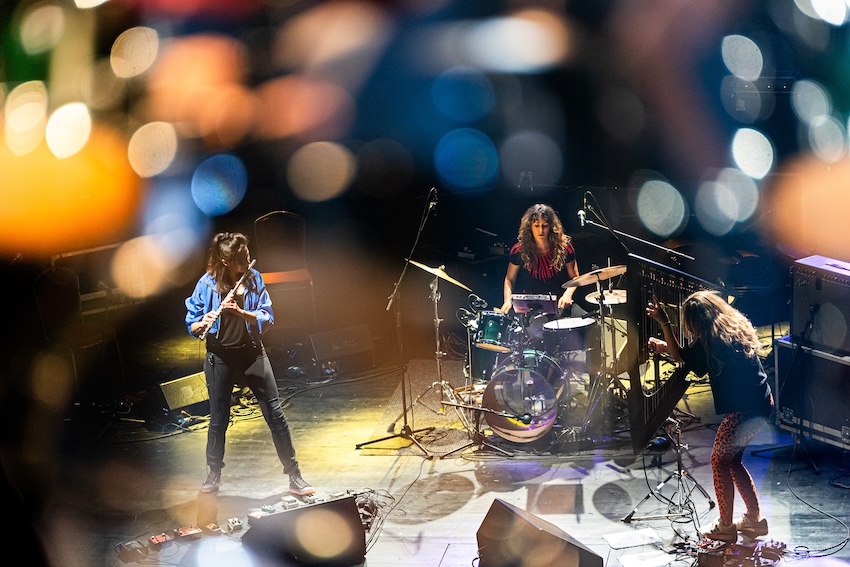
Nout : Greta Skaraitiene
Some might say that two-thirds of this instrumentarium is made for chicks. But so what? As is often the case in jazz, it’s how you play it that counts. There’s nothing to stop a 6’2″, 120kg colossus from blowing a piccolo, an ocarina, a tin whistle… And Nout‘s chicks have nothing to envy any guy when they sing their version of the Inspector Gadget cartoon soundtrack or meow into a microphone.
So, it’s shaping up to be jazz/metal/free-sounding/fun as hell. And that’s what we like, goddammit! It’s this kind of mix that invigorates the jââzz, much better than most world music mixes.
And it’s Nout who kicks off the evening in super melodic, swinging fashion.
We like Nout when they play without causing us the slightest pain. On the contrary: our ears quickly get used to the sound, which suddenly swells and rushes into a kind of rock, abruptly interrupted by a brief, pretty, tranquil melody before the noise (from the old French “noise”) starts up again (no happy prisoners, anyway!).
And the next tune is deliberately binary and noisy. But how are we going to end the evening if it starts off so loud and powerful (so bottomless do the little ones…). But the girl band called Nout is anything but a gang of bloody puppets. And the next track, on solo harp, is so tenderly cool you’d blubber with happiness. And when the flute joins its harp-playing buddy, we stifle a few long sobs which, in autumn, as Verlaine said… And in autumn, in Vilnius, the dead leaves are picked up at the call. But back to Nout! The electric harp is a rare instrument in jazz, and it would be nice if it didn’t asap become the second or even first instrument of any self-respecting jazzman/woman who would like to be respected, as we are doing tonight with Rafaëlle Rinaudo (and do we have a choice?). Let’s not forget the flute: from Yusef Lateef to Sylvaine Hélary, via Eric Dolphy, Hubert Laws, Lew Tabackin, James Newton, Magic Malik… it has long since acquired its jazz credentials, and Delphine Joussein injects it with a breath that’s sometimes gentle, sometimes powerful, with the help of a host of Hendrixian pedals.
And what about the drums? It’s – as luck would have it – the third instrument of the female gender (in French), along with the harp and the flute, but that’s not why Blanche Lafuente chose it, nor why her two companions joined forces with her. And she’s sometimes crackling on the cymbals, sometimes earthy on the toms and bass drum (that’s clear!) but always (re)bouncy, tonic, heavily binary, finely ternary…
In short, she’s understood and assimilated everything about the function of the only instrument created by and for jazz a little over a century ago.
The sententious musicologists who have recently examined the place of women in jazz would do well to listen to Nout and revise their comments, which, for my taste, are too marked by the gender studies fad that has come out of the States and is infecting European universities. In the meantime, Vilnius Jazz – under the impetus of Antanas Gustys who, like yours truly, has only procreated girls and is delighted about it – has always given an important place to jazz chicks, and can cheerfully serve as a model for more than one dominant male in the tribe of French festival programmers. Follow my lead…
And then comes the totally deconstructed/reconstructed soundtrack to “Inspecteur Gadget”, followed by a final noisy, atonal, rough-and-ready track in the style of a melodic mishmash. And, to finish us off, a wild rock (that’s its name) in the style of a powerfully playful binary punk, concludes this concert as initial as it is mo-nu-men-tal, which the audience applauds to the rafters. Once again, do they have a choice? Yes: whether or not to ask for an encore, which will be soft and repetitive, then slowly swell up to become a melody with strong scansion, dotted with flute and harp passages, supported by punchy drums. You don’t hear/see a trio like that twice a year!
The group that follows is so different that it will have no trouble winning the approval of the audience, larger than yesterday’s Friday night. All the more so as it opens with a very – and rightly – political speech by frontwoman Amirtha Kidambi on the place of Asian Americans, like herself, in the USA. The voice swells, accompanied by the harmonium, and the rest of the quintet play it free, but intelligently.
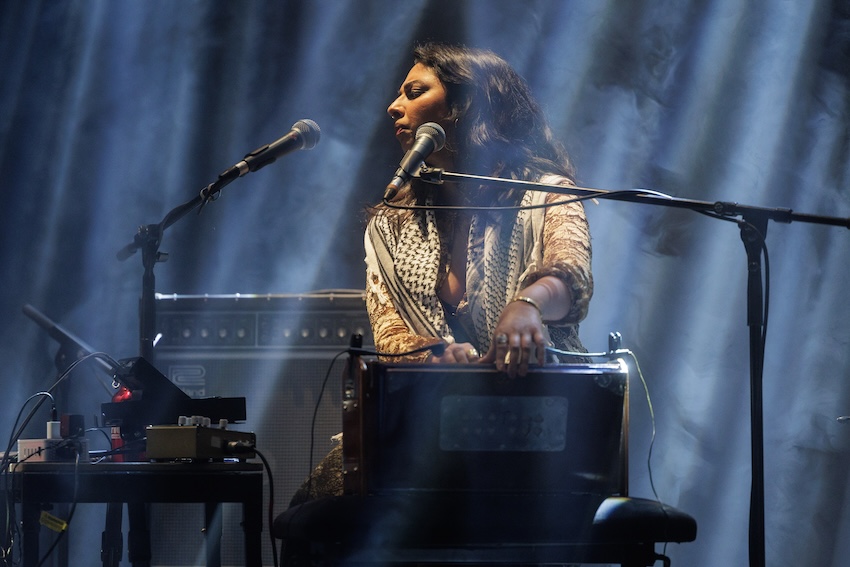
Amirtha Kidambi
The next track is dedicated to the peasants and, more generally, to all workers, including those in the music business. Such an approach obviously speaks to the citizens of a small country that suffered Soviet Russian domination for decades, even if the – fairly young – audience only knows about this period from hearsay.
In Vilnius, from what I’ve seen, all the young people speak fluent English. On the other hand, older people, such as shop assistants, only understand Russian. But as far as I’m concerned, ja nié gavariou pa-russky. So, I get by with my hands, just like in Italy, except that io parlo abbastanza bene l’italiano.
But let’s get back to our band of American wops, if you don’t mind. This second track is more cantabile than the previous one, and features some fine tenor, soprano and double-bass solos before or after the vocalist sings in a beautiful, sumptuously timbred voice. The band’s personal sound is totally convincing and rich.
It has nothing to do with the Brooklyn sound we’ve heard so much about in the Dave Binney-John Hollenbeck movement (to cut a long story short), which has had some great successes but has tended to become a little hegemonic for my taste. Here, socio-political commitment is neither trendy nor bohemian.
The next track, introduced by a vibrant speech applauded by the audience, is dedicated to the victims of racist justice in the USA, and it’s a beautiful, repetitive, enveloping melody, supported by the harmonium and the whole band, that rises in the Vilnius Theatre. An intense melody that lends itself to contemplation, especially when the soprano – the highest-pitched instrument – takes a magnificent, lyrical solo against the background of the rest of the quintet’s basso continuo. Frankly, it’s enough to make you weep with emotion, without restraint or moderation. And when Amirtha Kidambi‘s voice starts singing again, this time with lyrics, it eases the tension and pushes the whole thing towards a kind of redemptive swing. “Bastard Yanks: they come right into our arms and make our sons and daughters cry”, the Lithuanians must be saying to themselves in petto, as they’re supposed to be the Italians of the Baltic (which I can confirm from the height of my meter 78 and my 45s).
Well, the emotional high ground is beginning to take its toll.
My word, it’s like being at the Olympics when Teddy Riner or “King” Léon kick the crap out of foreigners who, as we all know, are not people like us. “As a Cartesian who doesn’t mix soul and body – which, by the way, is starting to get hungry – I can’t help it, it’s my crazy metabolism that sends me into hypoglycemia every 2 or 3 hours.
Don’t tell any jealous colleagues, but even though I’ve reached a venerable age, I’ve kept up the rhythm (and tempo) of the baby bottle. You never change!
Hey, Quénum, aren’t you supposed to be talking about a quintet of splendid mixed-race Yanks instead of telling us about your life, which nobody really gives a damn about.
You’re right, guys ‘n’ dolls. I’ll go back down to the pencil (mine is called MacBookPro) and tell you about the end of this very, very beautiful second concert on Thursday night in Vilnius.
The last track is a sort of declamatory slam without harmonium, accompanied by an inspired quartet (double bass with bow, pointillist drums, blowing blowers) which continues in pseudo-satanic cries and sneers (a bit of humor too, then).
Then the harmonium comes to mind, while the voice sings at the top of its lungs, followed by a raucous tenor sax that alternates honks and shrieks, followed by the soprano that chirps in continuous breath. Well, that’s just too good: I’m going to relieve my prostatic bladder and lighten my mental load!
Third night
On Friday evening, the Theatre is packed to the rafters.
On the other hand, the music of the first group, a lithuanio-nippon trio, is full of emptiness, or rather silences, which is rather restful for me, myself and eye, since I’ve just given a lecture in the afternoon on “The Art of the Arranger” to a sparse but attentive audience in the auditorium of a beautiful new museum, a stone’s throw from the Theatre.
Don’t be jealous, reader friends: I’ll be doing this lecture again in half-hour segments on couleursjazz radio before long. So these two Japanese percussionists and electronics and this Lithuanian pianist make music that sounds a bit like Federico Monpou: lots of silences, a few notes and a bit of noise. Clearly not my cup of tea or my bucket of lukewarm sake, I’m going to finish smoking my pipe outside where a fucking full moon is likely to bring werewolves out of the bushes, dotted with dead leaves in colors far more shimmering than the music of tonight’s first trio.
The second group, the Kondo Tatsuo K3, gets off to a better – yet quiet – start with Carla Bley’s magnificent “Vashkar“, played by a luminous, melodic and peaceful piano. It’s good to hear this heart-warming music, a far cry from the aridity of the previous act.
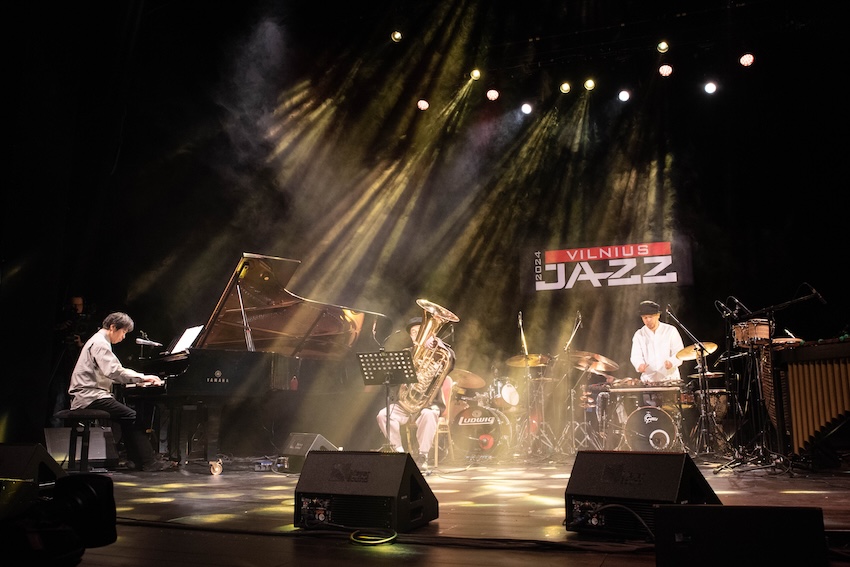
Kondo Tatsuo ©DK foto
And when the sound swells, while keeping the same moderately slow tempo, we hear a very interesting band sound in which the tuba, instead of the bass, occupies a novel and entirely relevant place. In the more abstract track that follows, the drummer-percussionist gives full rein to his colorist art, while the tuba rumbles and the piano plucks chords from the keyboard’s low register.
The huge Japanese “Special Big Band” that closes the evening is utterly enthralling, drawing its inspiration from rock, pop, classical music and free jazz. It’s an amazing mix in which mass effects dominate over solos. Beautiful sonic textures and dynamics, a highly original sound, a varied and eclectic instrumentarium featuring accordion, vibraphone, tuba, electric bass, two drummers and a percussionist, not to mention the blowers, and so on.
How can Vilnius Jazz program such a large phalanx from so far away? I’ll ask Antanas, but these Nipponese are on a European tour and the venues hosting them must share the transport costs. What’s more, these Asians have been in Vilnius for a few days with their families, staying in the same hotel as me, and this trip must be partly touristy for them. In any case, what other European festival offers both Japanese and Australians? Come on, give me some names. I’m waiting!
In the small capital of a small Baltic country, the program is more inventive, curious and daring than in many big French raves, and the Vilnius Theatre is packed with an audience whose average age is well below that of our French festivals. And the concert ends with a fanfare followed by a hymn as deep as the China Sea, populated by islands dotted with Zen temples.
The damn Nipponese reminded me of the glorious days of the Willem Breuker Kollektief, the orchestras of my main Man Mike Westbrook, the Globe Unity Orchestra of Alexander von Schlippenbach, which doesn’t make us any younger, but who cares! It’s great to know that in the land of the rising sun, this tradition – both rigorous and libertarian – has not aged in the slightest, all with a smile, a good dose of humor and a contagious pleasure in playing, that drives the audience to howl their joy and stand up as one for a standing ovation that’s more than deserved.
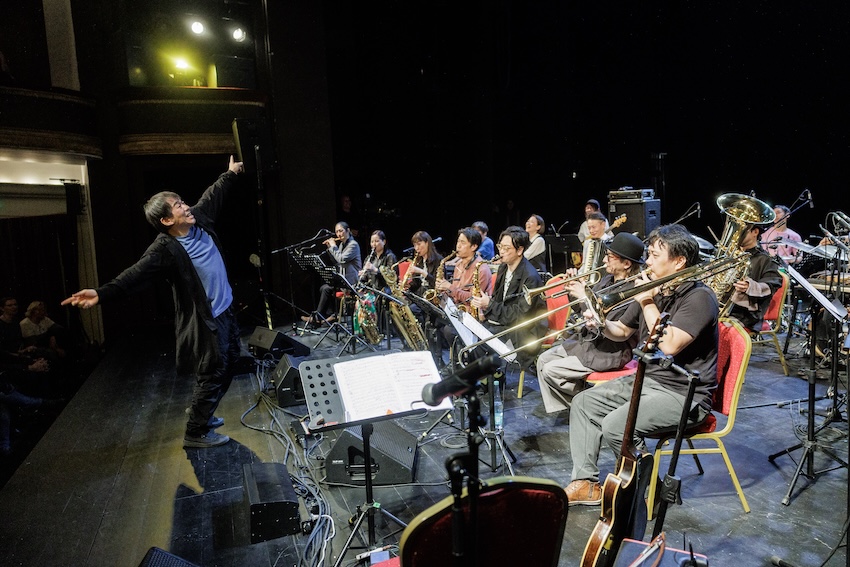
Otomo Yoshihide
Remember the name (Otomo Yoshihide) of the leader of this inventive, playful troupe, and don’t delay in buying your ticket to Tokyo. But what are you waiting for? You should already be at the gate at CDG!
Fourth evening
A little less crowded on this Saturday evening, where the style played is more European free/post-free, which arouses less curiosity than yesterday’s Asian SB(B)SD (Super Big (Band) Sushi Dinner. Hi! Hi! Hi! How stupid that Quénum guy is! Where on earth does he get his silly, hilarious sense of humor?)
The opening quartet is Anglo-Lithuanian and plays the kind of half-peachy, half-abstract jazz we’ve heard a lot of over the last decades: piano/alto sax/drums/electronics. I’m not a big fan of laptop tinkering, but it’s bearable and the Mac manipulator remains fairly unobtrusive.
The most interesting of the four, in my opinion, is the drummer, whose kit is enriched with orchestral timpani and various melodic percussion instruments, giving his playing a welcome color as well as obvious polyrhythm. In fact, he’s the only one to move and occupy space, shifting from right to left according to the instruments he’s using, while his companions stand tall on piano, sax and Mac. Their music, though well played, has little charm and, for my taste, there’s too much of a desire for partially intellectual research. In short, it lacks flesh, fresh or otherwise.
I’m looking forward to what’s to come, because I’m very fond of John Butcher, the project’s leader, and it includes my main Man Liudas Mockunas (whom I’ve known for some twenty years) on saxes and clarinet. I saw him a few days ago at Le Triton des Lilas (near Paris), in a duet with my main Man Marc Ducret, the only French guitarist to have been endorsed by American musicians such as Tim Berne.
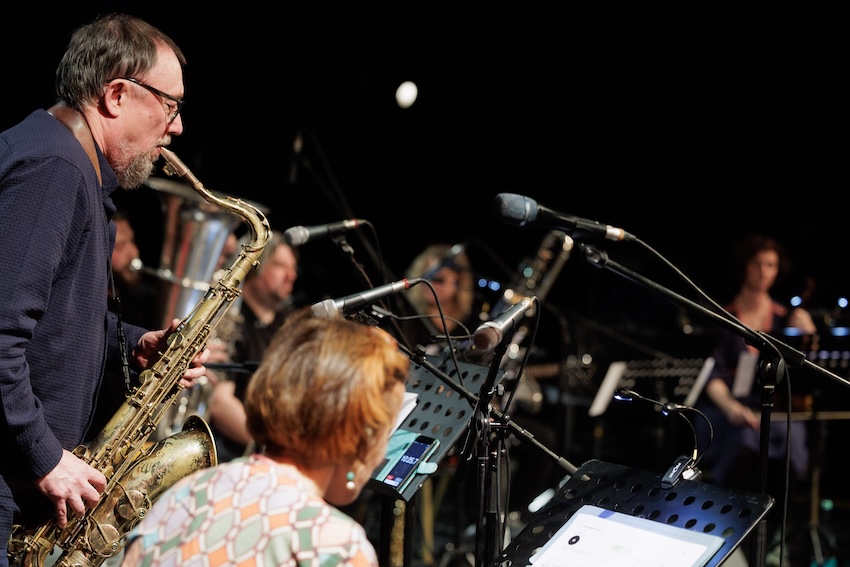
John Butcher ©Vygintas Skaraitis
The Lithaian Project concert begins with a rather muddled sound effect, full of little snatches of semi-melodies, which we sense will produce many sonic nuggets in the near future.
A near-silent track is followed by a strident sound, due in part to electronic effects, from which the French vocalist’s squeaky voice emerges. All this produces a suspenseful effect, as we wait for the band as a whole to have a chance to express itself.
Now it’s the violin’s turn to stand out, with little bow strokes, from this rather interesting mush of sound. Then the tuba gently enters the scene as the sound swells and is joined by a few other blowers. It seems clear that there will be no real solos. But it doesn’t matter, because we’re carried away by this dense, fluid, bushy and ductile ensemble sound, which the audience listens to with intense attention and total contemplation.
But I was wrong: here comes the tenor sax for a chorus! Interesting, niet? All the more so as he modulates with tenderness before moving on to repetitive growls and slaps.
After a short interval of silence, the whole ensemble intones a kind of noisy anthem that swells in power. This is followed by a mini-tuba solo and then another tenor solo by Liudas – which I would have liked to have heard for longer.
The double bass has its say, too, and does it well, all smoothly, and Liudas‘s sopranino sax responds in nice little high-pitched strokes, but not too much. This is exactly what I wanted to hear from this major saxophonist, who is not yet sufficiently well known in France. And when the soprano of the tenor from earlier responds, you can see (hear) that they share the same free-lyric aesthetic. The ensemble then resumes in full, with Liudas again on tenor. Well, John Butcher was right to feature this blower.
To my ears, he’s the most interesting of the lot, without overdoing it, as he’s surrounded by first-rate partners. The audience, however, is gradually thinning out, and it’s mainly young people who are leaving. Perhaps this type of free jazz is too much for them. On the other hand, there’s a good chance we’ll find them later in the evening at the club, where a young scene can express itself, but where the quality of the music, from what I could hear the day before yesterday, is distinctly weaker, albeit convivial.
However, I’ll be going later this evening, as the first band features a young German bassist I met yesterday, whom I’ve obviously never heard before.
Some people might ask: “What’s this FFJJ (F…in’ French Jazz Journalist) doing in Vilnius?
Well, the answer is simple: the city is magnificent (the only thing missing is the sea), the population is seriously cool and welcoming, the festival is one of the best in Europe in the modern-to-free genre, not boring for 1 penny, Antanas Gustys – the boss and creator of the event at a time when Lithuania was still under Russkoff domination is one of the nicest and most competent festival directors I know, and I’ll soon be taking a checked bag on Air Baltic to bring him a case of Morgon and Moulin à Vent, instead of the simple bottle of good red I picked up in the duty free zone at CDG accompanied by a few small macaroons.
And because of this (I’m talking about Antanas’s competence, not my deliciously French gifts), the music is constantly varied and most of the time super-interesting, even moving.
Is that reason enough for you? No ?
Then I’d like to add that this little capital offers an impressive variety of restaurants of all stripes (Armenian, Uzbek, Italian etc. and Lithuanians of course, where the soup is popular without being proletarian and extremely varied.
And now, please, leave me in peace to listen to the music of the young and excellent free band featuring my new bassist friend from Berlin. These young people have understood all there is to know about historical free music in the US rather than Europe, and they’ve made it their own in an intelligent and sensitive way. I’m not sure I’d buy one of their CDs if they had them, and even less sure I’d listen to them while drinking my morning grapefruit juice followed by a triple espresso ristrettissimo, but here, live with a good local beer, it’s perfectly listenable and just waiting to mature.
The only thing they lack is the little dose of humor that some of their European predecessors knew how to inject into their excesses.
And Izzy, the bassist, is really excellent – and I’m not saying that out of crony complacency. You know me a bit, don’t you? That’s clearly not my style, and my impartiality – the envy of the world – prevents me from indulging in cheap sentimentality. By the way, the two saxes (soprano and tenor) aren’t bad either, and the drummer is really good. Here’s a little test, kids: end your set with a good old-fashioned ballad that’ll bring a tear to our eye, so we can have a few laughs!
Wishful thinking, as the Rosbif/Hamburger say: I take my desires for realities, in French, and my desires make a mess of the organized sonic disorder of this Lithuanian-German quartet. Patience and length of time… said Jean de La Fontaine. But I’ve got all the time in the world, and I’m waiting for them to turn one of these, or even later.
But it’s getting late, and both my body and my ears are yearning for some rest, all the more so as – as is often the case – the concert has scarcely finished before we’re treated to some shitty, loud music that doesn’t allow us to savor the hints and snatches of what was played live on stage. I’m fed up with this mania for not tolerating silence after the moozik. Anyway, let’s go!
Fifth night
For the finale of Vilnius Jazz, Antanas has programmed Cuban pianist Aruan Ortiz as opening act, whom I only know from the records he has recorded as a trio or as part of the quartet of American saxophonist James Brandon Lewis, but whom I have never heard live, and therefore never solo.
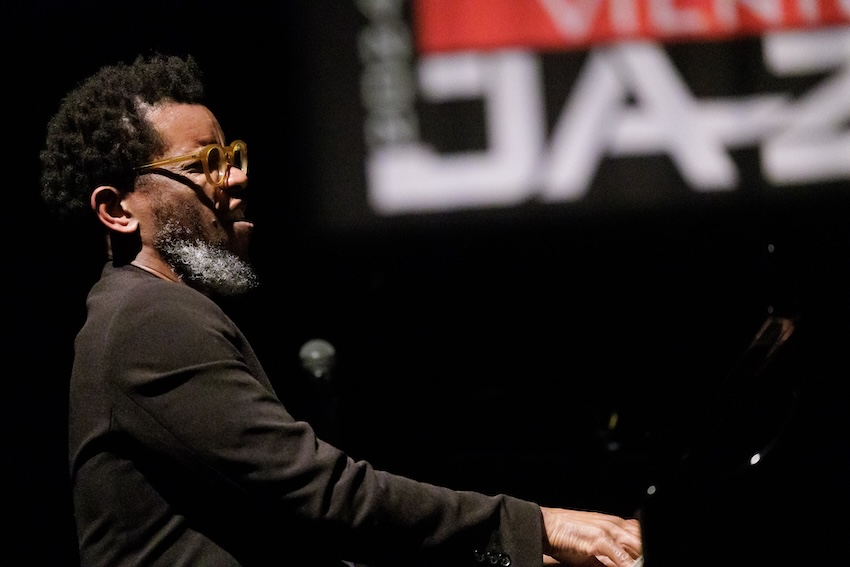
Aruán Ortiz ©Photo Vygintas Skaraitis
So, this will be the only solo piano concert of the festival, and Ortiz kicks it off gently and without the slightest hint of his Cuban origins. After all, you don’t have to play Celtic tunes on the bagpipe because you’re born & raised in Brittany, or the cabrette because you’re from the Puy de Dôme, where you’ve spent your leisure time grazing Salers cattle and milking their sisters, mothers and cousins before enjoying their rare steaks with aligot galore, do you?
Then there’s Aruan – whom I went to say hello to in the dressing room before his concert, and who took the opportunity to borrow one of my drum sticks (because when you want to try and be a not-too-bad percussionist, you don’t want to part with those bits of wood ending in an inedible olive).
All Cuban pianists I know began their apprenticeship with percussion – and, in case you didn’t know, the piano is also a percussion instrument, part of the symphony orchestra’s percussion equipment along with the orchestral timpani, triangle and other bells – and now Ortiz‘s piano swells with chords plucked with both hands to an increasingly fast but still not Cuban rhythm.
This pianist is first and foremost a jazz musician, having studied with the late Muhal Richard Abrams, one of the most eminent members of Chicago’s famous AACM.
And now he’s chaining together a series of percussive pearls in the keyboard’s high notes: a veritable shower of little pearls of sound that soon become rare, leaving silences between them which, as we all know, are always music.
And the concert progresses seamlessly, introducing pretty little melodies with an alert, syncopated right hand, while the left hand lays down powerful but never heavy chords with a sense of the unexpected that borders on the aleatoric, yet denotes a keen sense of harmony. It’s not at all Cuban, but at the same time, who else but these Spanish-speaking Caribbean islanders is capable of such sharp, bluffing rhythmic placement?
Come on, I’m waiting for an answer! Would you prefer a written test in two weeks’ time, while you prepare your crib sheets? Not me: ! have something else to do.
And now Ortiz uses all 88 keys to alternate sumptuous low chords plucked with an iron left hand and repetitive melodic snatches in the medium range with the right hand. It’s a torrential flow of impressive harmonic-melodic density, and the piano resonates powerfully in a near-capacity Theatre.
Ah, now he’s using his hands and my drumstick in the soundboard. So at least I’ll have served a purpose other than drinking beers and listening to music and writing about it during this festive and enchanting festival! And here come snatches of a Thelonious Monk theme under the fingers of the Cuban, who will only sketch out the melody to explore its harmonies and transcend them in his own (spicy?) sauce, a tasty, thick sauce bathed in Monkian tradition without being even remotely traditionalist, so rich is the repertoire of the Hermit of Harlem’s potential from which modern and contemporary musicians can draw without moderation.
Aruan Ortiz‘s fingertips, returning to his initial gentleness, bring to a quietly serene close a masterly recital that the Lithuanian audience followed with rapt attention, and which undoubtedly nailed with pleasure and delight all those present in the Theatre who have ever, from near or far, touched the 88 keys of an acoustic piano, yours truly included.
The ensemble that follows, the LEN Ensemble, whose project is called “Louis Andriessen-M is for Man”, is partly classical-contemporary, and the musicians enter the stage one by one, adding to the repetitive rhythm of the piano and double bass, which they enrich timbrically by keeping the same rhythm and tempo. The sound is very impressive, and the conductor leads them with a syncopated beat that is visually pleasing to follow. In fact, the Ensemble – apart from the piano/double bass pair – is made up entirely of blowers: reeds, flute and mouthpieces. Eleven in all, playing with the usual rigor of musicians accustomed to this kind of music, so demanding in terms of accuracy and positioning.
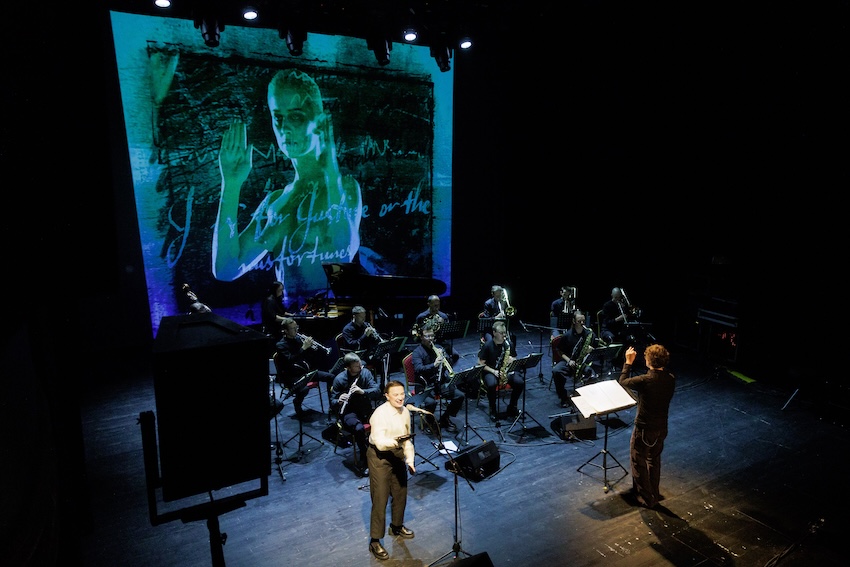
Lens Ensemble
Melodically speaking, it’s quite beautiful, bluffing with precision and sonic color. And when they all start singing la la la rhythms, you start to notice that a dose of humor has infiltrated this otherwise rigorous music. All right: it’s not jazz, and it’s not jazz at all-although rhythmically it may come close. But it’s still better than some of the excursions into world music and pop that many French jazz festivals indulge in to fill their halls.
What follows is a small excerpt from black-and-white archive footage showing, mockingly, Mussolini in full speech. It’s a bit long, especially as one of the Duce’s phrases is repeated in a loop for several minutes over a still image of his face, until the image blurs and then disappears as the repetitive phrase is replaced by a long – too long! – muffled growl. It’s all right: we’ve understood that the Duce was a buffoon and fascism a sad, tragic, bloody pantaloon.
But we’re being taken for a bit of a fool to repeat this over and over for so long, ending with the beginning of the music from Richard Strauss’s “Thus Spake Zarathustra“.
In the meantime, the zicos have returned to the stage, with the added bonus of a high-pitched, squeaky-voiced singer chanting in a language I can’t identify, while the giant screen flashes silent images of nude dancers and some kind of soup kitchen. Meanwhile, the musicians parody Mozart quite convincingly, with a brass band sound. On the screen are images of workers at work, then a sort of corpse appears, followed by the image of a mute singer, while the live singer from earlier has returned with a clearer, more nuanced voice. The workers on the screen have become a kind of naked slaves, kneading and mistreating a reclining naked body that gradually comes to life until it sits down, then stands up and gently dances. The aesthetic resembles that of ancient Egypt and, although a little morbid, it’s visually quite beautiful and quickly becomes a kind of silent musical while the live voice and musicians adopt a Cubist fanfare tone and then sing a playful nursery rhyme. And now they sing a Nino Rota-style tune over moving images that look a little like Fellini in black and white. The giant screen projection ends. The only thing left on stage is the music, which has become elegiac and magnificent in its melodic nuances. And when the soloist resumes her extremely gentle vocals, it’s like a soothing balm after the deluge of brutal and quite trying images. “De la musique avant toute chose…” (Music before anything) said French poet Paul Verlaine. Afterwards is good too!
And so ends the 37th edition of Vilnius Jazz, which was even more interesting and varied than last year’s event. And next autumn… guess what… Antanas tells me that, in the wake of the 2024 Franco-Lithuanian cultural season, Vilnius Jazz 2025 will focus on the contemporary French jazz scene. So, dear readers, you know what you have to do… Of course not:
1) ask your wallet to put some money aside from right now.
2) invest in a round-trip ticket to Vilnius and a B&B or hotel of the same metal, and prepare yourself spychologically to get a kick out of hearing local bands partly mixed with Lithuanian zicos.
This is not advice, but an order. As usual.
A few weeks after Vilnius Jazz, a Franco-Lithuanian concert took place in Strasbourg as part of the Franco-Lithuanian cultural season: a foretaste of Vilnius Jazz 2025.
Blaser/Ducret/Mockunas, Strasbourg Cité de la musique 09/11/2024
The large auditorium of Strasbourg’s Cité de la Musique is barely half-full for this Franco-Lithuanian evening, or Lithuanian-French if you prefer (Ah, you prefer. So okydoky!). But that’s not going to stop the Lithuanian-Hellenic-French trio of Liudas Mockunas (s/cl), Samuel Blaser (tb) and Marc Ducret (elg) from sending up a thick mashed potato from the very first theme (Oh, Zeus help us poor humans (even the rich ones)! What sauce(s) are they going to eat us up with, those mthrfckrs of their mother’s?
As always with these three, it’s completely melodic-free, because – I’ve said it many times and I’ll say it again without the slightest complex or vain modesty – these are FREE SINGERS! (Damn – I mean damn-fckn’-watery-fckn’-mess – you’d better listen to me a bit, or I’ll have to shout it in your eardrums (Here, bang! bang! U’re dead, fatso & the plump girl close to U!). So, what we’re listening to, apart from the pretty little (not so little, in fact) melodies, is their damn band sound.
All the more so as this bloody Liudas has brought along several saxes (not Saxon vases, nor the southern Spanish mud that seems to have spared the Guadalquivir – the great river whose original name is oued el k’bir : in Arabic, river the great – nor the Bohemian crystal or the Limoges porcelaine…) including a sopranino sax and a bass sax: this magician of reeds masters all sax and clarinet reeds, clearly and unmistakably.
And here he unwinds the melody on soprano while his two patient henchmen weave a super-soft and very, very subtle net of accompaniment. A net, I said, not a bulletproof vest, because he doesn’t need one, since he’s a soft killer and his bodyguards, who he doesn’t need because they’re not bodyguards, are themselves snipers who get you out of bed, off lithium and out of crime – of which you’re obviously guilty. Come on, I know you and you don’t fool me!
Here they’re playing three parallel melodic lines, Liudas on clarinet, and it’s so beautiful my throat’s in knots and tears are tingling my nodes. Liudas, alone on raging tenor, is soon joined by the other two in unison melodic lines. Then Samuel pulls out the mute for a solo and it’s a series of low wah wah wahs, then higher, to continue unmuted, declaring that he’s the greatest tb of his generation in the fckn’ World, and more if you like.
The other two join in, and then it’s Marc‘s turn to solo with his damn guitar, customized by his luthier who gave him 5 or 6 of them, and not to play in 5/4 or 6/8. The guitar meows softly and sweetly, and at times I hear “O Gelsomina” from Nino Rota’s “La Strada“, soundtrack, but perhaps I’m mistaken as my ears are saturated with beautiful sound (not noise at all, but much can be too much for a poor FFJJ (French Fckn’ Jazz Journalist). Liudas is now on tenor, singing an enchanting repetitive melody, and the other two give him a royal break, listening attentively before joining in with parallel, almost contrapuntal lines. KILLERS, as I said, and as all three of them compose, I don’t know whose track is whose.
Yes, there’s a theme by Marc, briefly hinting at the 2/5/1 of Coltrane’s “Giant Steps“. And it’s Ducret who takes the first solo (God willing…) Oh Lord (in whom I have no faith) have mercy on us, for your mercy is great, and here we are, poor sinners of sound, nailed to our fckn’ seats, drooling at the corners of our mouths, and we don’t even have facial diapers. Help! Help us! They’re going to kill us and incinerate us in the molten cauldron of their free-sound. They show no mercy. The Russian + Israeli army, next to them, are nice, little burnt-out amateurs. But what do the police do? Well, they collect the bloody fines from the speed cameras and let the SUVs squat in the bike lanes, as usual, what U think, Quénum? You’re really a big naive donor (of post-mortem organs, but we love you (Carnegie) Hall ze same – and Nietzsche, Spinoza, Stirner et Morin encore more, by Jove & all the Kropotkines whose “La morale anarchiste” costs 4€).
Well, they’ve said that the hymn they’re singing at the top of their voices is the last piece. But they’re damn liars and there’ll be an encore, sure enough… Otherwise I wouldn’t put much stock in their animal skins on appeal to the Tribunal de Grande Instance, your Honor.
Next up is a small Grand Orchestre (12 instrumentalists, including co-leaders/co-composers Marc and Liudas). They begin with breath effects in the reeds and mouthpieces over a rather random syncopated rhythm. Then Bruno Chevillon‘s double bass, Arnas Mikalkénas‘s piano and Peter Bruun‘s drums begin a beautiful trio melody that swells and swells to become a hymn played by the ensemble, where I think I hear Coltrane’s 2/5/1 (again), and where the baritone sax and then the alto chorus free one after the other, before giving way to Marc‘s ferocious guitar and Liudas‘s generous tenor.
When things calm down a little, the flute takes over, accompanied by double bass, guitar, drums and tuba. Then the ensemble begins a sort of crazy rock.
And the encore is obviously very gentle: guitar and piano followed by flutes and other very melodic blowers.
Well, there you have it: Lithuania is a small but great European jazz country, and if you don’t come to Vilnius next October, I’ll know it and I’ll scold you severely, which will obviously be unbearable for you and will undermine your morale ad vitam.
©All Photos
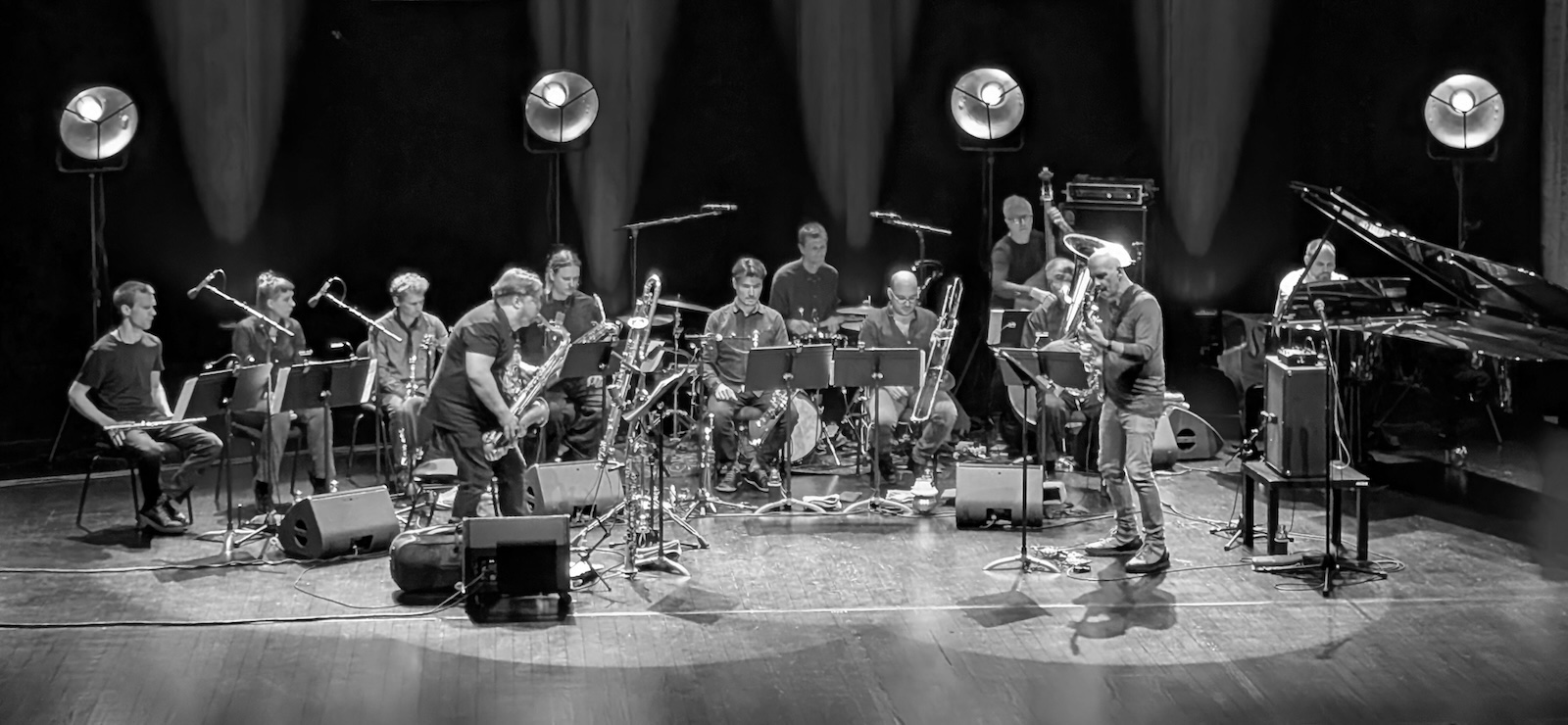


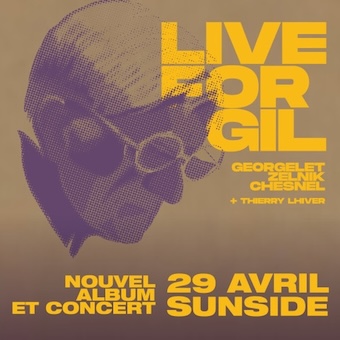
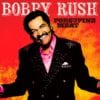


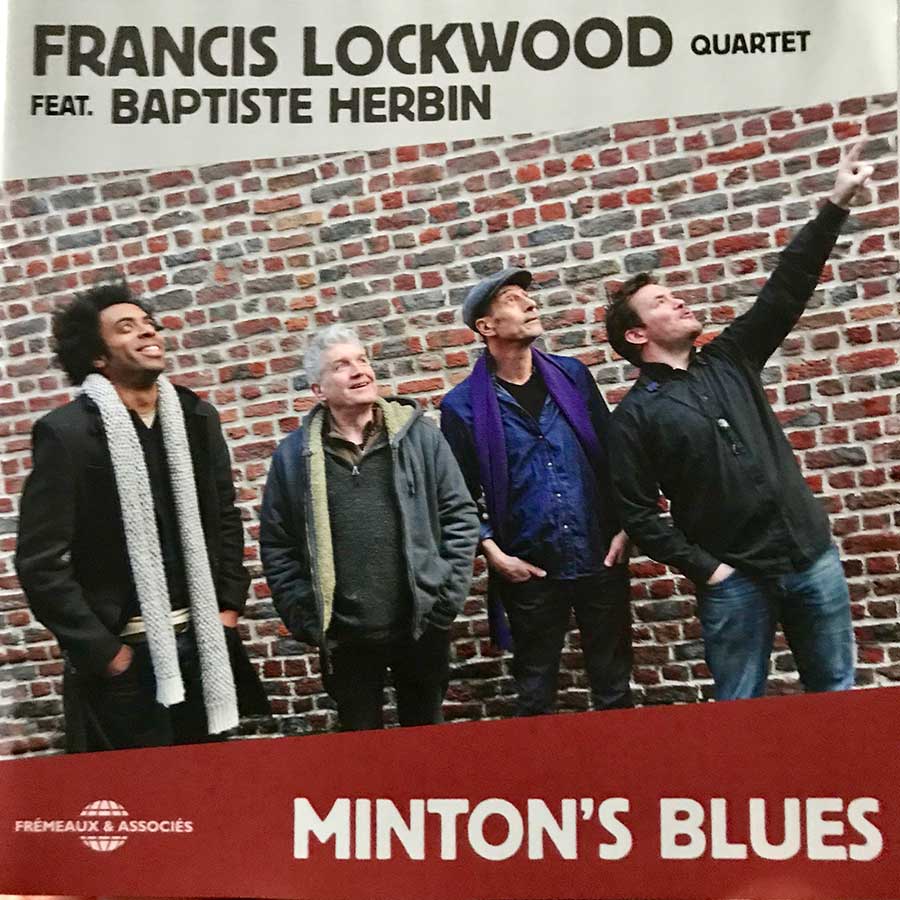


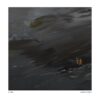
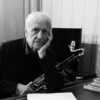
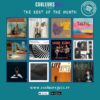


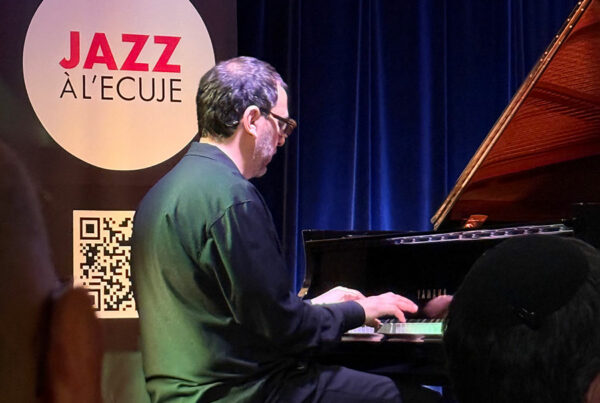
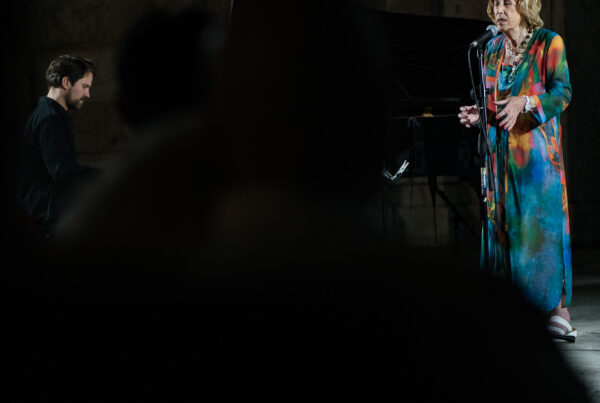


RECENT COMMENTS